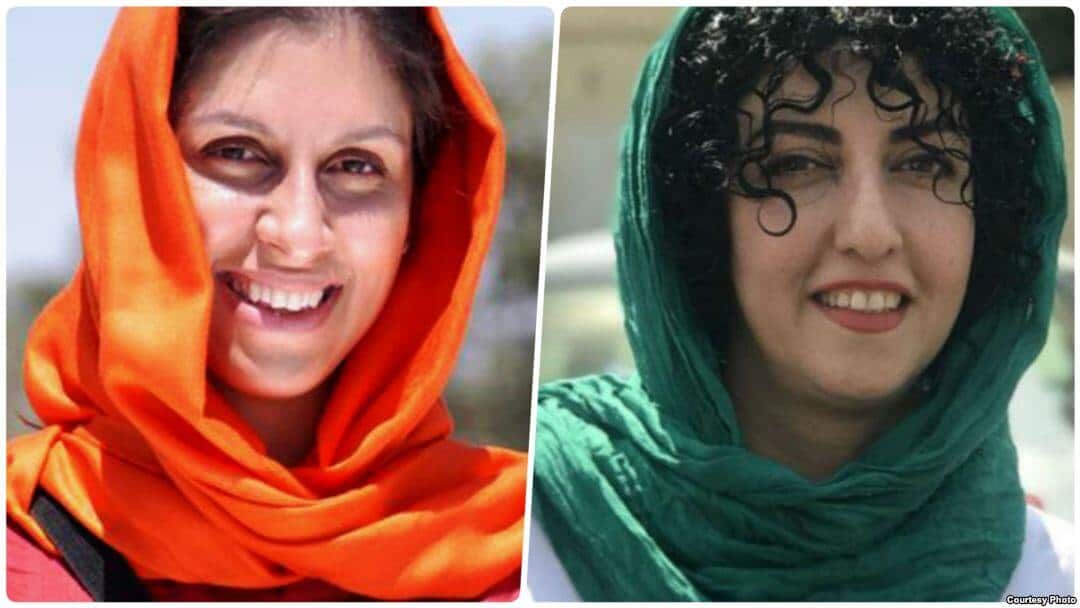Political prisoners Nazanin Zaghari-Ratcliffe and Narges Mohammadi (File)
Iranian authorities have relented and allowed Anglo-Iranian political prisoner Nazanin Zaghari-Ratcliffe access to medical care, following a three-day hunger strike by the charity worker and Iranian human rights activist Narges Mohammadi.
The Free Nazanin Campaign said on Wednesday that it “can confirm with relief that Nazanin and Narges have ended their hunger strike today, and have not extended it beyond the original three days”. Zaghari-Ratcliffe’s lawyer said “he had confirmed the permission for the treatment they needed to end the strike”, and said medical appointments should be arranged for week.
The Campaign summarized, “They had both made their point. The authorities realised that there was a lot of attention on their cases, but they did not need to provoke them further.”
The two women announced their strike in early January. Zaghari-Ratcliffe is concerned about lumps in her breasts, neck pain, and numbness in her arms and legs, and was also being denied access to a psychiatrist, despite the recommendation of the prison doctor.
Mohammadi was reportedly denied care for more than a year for a pulmonary embolism, blood clots, and seizures.
Zaghari-Ratcliffe, a project manager with the Thomson Reuters Foundation, was arrested in April 2016 as she and her infant daughter Gabriella were flying out of Tehran after visiting relatives. The charity worker was sentenced to five years for plotting to overthrow the Iranian regime, a charge unsupported by any public presentation of evidence.
Mohammadi, vice president of the Center for Defenders of Human Rights, is serving a 16-year sentence for her role in the CDHR and for “establishing and running the illegal splinter group Legam”, which campaigns for the abolition of Iran’s death penalty.
The Iranian regime initially responded to the prospect of a hunger strike by taking an even tougher line. Iranian State TV broadcast a “documentary” which claimed Zaghari-Ratcliffe, then an administrator with BBC Media Action, had trained journalists in the overthrow of the Islamic Republic after mass protests over the disputed 2009 Presidential election.
Zaghari-Ratcliffe’s husband Richard Ratcliffe said Nazanin was told by Revolutionary Guards in late December that she would be “safer afterwards” if she spied on the UK Department for International Development and the civil society organisation Small Media.
But Tehran faced growing international attention to the case. The UK Foreign Office protested the denial of care, and UN human rights experts said: “We urge the Government to immediately and unconditionally provide Nazanin Zaghari-Ratcliffe and Narges Mohammadi with access to the appropriate treatment and care they have repeatedly requested in light of their serious health concerns.”
UK Foreign Secretary Jeremy Hunt tweeted on Thursday:
Thank you Iran for giving Nazanin access to the healthcare she needs – please now take the next step and let her home to be with her husband and daughter. #FreeNazanin
— Jeremy Hunt (@Jeremy_Hunt) January 17, 2019


Iran State TV broadcaster appears in DC court: https://www.foxnews.com/world/iran-state-tv-broadcaster-to-appear-in-dc-court-today-network-says
“The newscaster, who also holds Iranian citizenship, was detained Sunday in St. Louis on a material witness warrant, her son has told The Associated Press. But the exact reasons for her detainment remain unclear and it has not been confirmed by authorities.”
“The charity worker was sentenced to five years for plotting to overthrow the Iranian regime, a charge unsupported by any public presentation of evidence.”
The “charity” she worked for (BBC WorldService Trust) was working with the Trainign Station on a covert journalist training program for which she was assigned responsibility for implementing. This occured exactly at a time of political unrest in Iran following the 2009 presidential election. Iran believes that this was a subversive attempt to train informants for British intelligence and to place negative propaganda in the press. Her former employer denies that she was doing anything other than minor “clericial duties” which is laughable given that she is a journalist who holds a Master’s degree.
There is no evidence or this propaganda line which you have repeatedly pushed here, Reza.
The documents of her involvement in the covert training program were released by the authorities: https://www.presstv.com/Detail/2017/11/25/543489/Iran-Britain-Nazanin-Zaghari-BBC-ZigZag-Training-Station-USAID-Keith-Preston-Press-TV
The former Foreign Secretary, Boris Johnson, let slip that she was involved in the program when she worked for BBC World Service Trust in cooperation with BBC Persian before her current employment with Thomson Reuters: https://www.theguardian.com/politics/2017/nov/06/boris-johnson-mistake-could-harm-case-for-nazanin-zaghari-ratcliffe-say-family
He was criticised at the time for essentially telling the truth about her activities with the BBC.
U.S refuses to comment on the arbitrary arrest of Marzieh Hashemi of PRESSTV who is currently in detention in the U.S on unspecified charges. She was visiting family and making a documentary about the shootings of black males in the U.S at the time: https://www.cbsnews.com/news/melanie-franklin-marzieh-hashemi-us-iran-press-tv-anchor-arrest-material-witness/